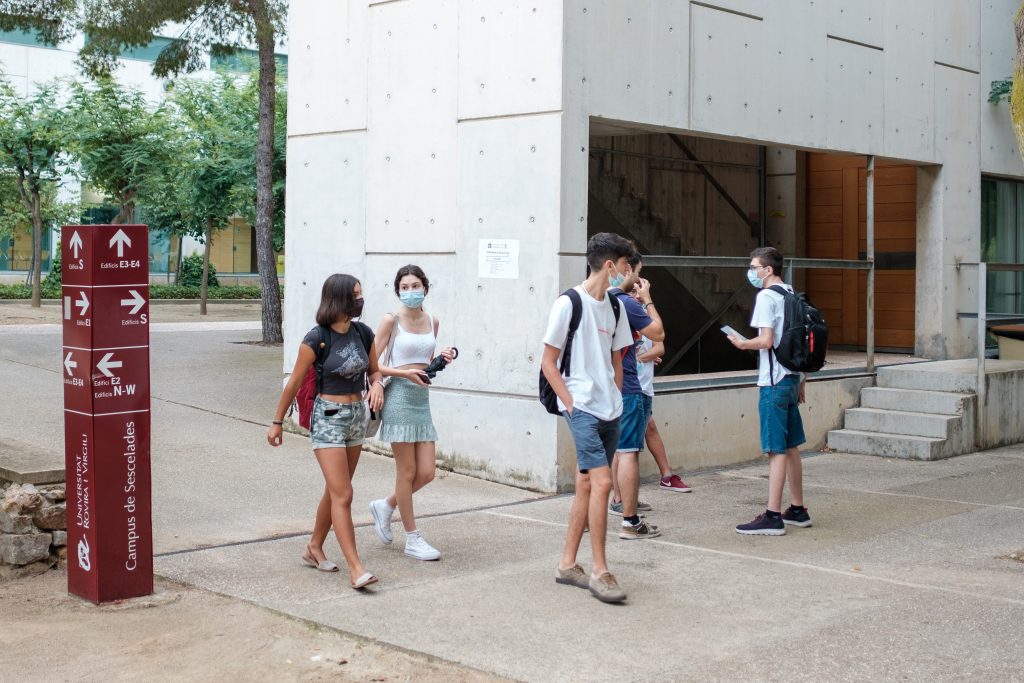21/09/2021
COVID-19 Contingency Plan approved for the 2021-22 academic year
Students and University staff must notify the URV’s internal eCOVID application if they have symptoms compatible with those of the virus, if they have been in close contact with a confirmed case or if they have received the results of a PCR or antigen test

Students and University staff must notify the URV’s internal eCOVID application if they have symptoms compatible with those of the virus, if they have been in close contact with a confirmed case or if they have received the results of a PCR or antigen test
In its extraordinary meeting on 20 September, the URV’s Governing Council approved the COVID-19 Contingency Plan of the URV and the URV Foundation for the 2021-22 academic year, which details the preventive, protective and organizational measures that have been adopted to deal with the pandemic for the current academic year.
Whereas the goal of last year’s contingency plan was to cut transmission chains, this year’s plan, with most people vaccinated, aims to ensure safe attendance on the URV’s premises. To assist in this, the URV has launched the eCOVID application, which can be accessed at urv.cat/coronavirus. Now, students and staff with COVID symptoms or those who have been in close contact with a confirmed case can and should report their condition and the results of any PCR or antigen tests. If they have been diagnosed or are waiting for the results of a test, students will have to follow classes from home and the staff members will be required to work remotely. Also, anybody who is diagnosed positive will not be permitted to access the University’s premises.
It is the responsibility of both students and workers to know who they have been in close contact with at the URV and the FURV, that is, people with whom they have been in contact for more than 15 minutes without protection measures in a 24 hour period at a distance of less than 1.5 meters, so they can inform the COVID officers if necessary.
Mandatory masks and ventilation in indoor spaces
The plan maintains several of the measures already in force since last year and specifies the new measures related to teaching, which this year has returned to being delivered face-to-face. As such, masks must always be worn both in common spaces and open spaces of the URV and FURV. In enclosed spaces, they can only be removed if an individual is alone. Furthermore, in addition to the use of masks everywhere, the plan sets out the most important preventive measures, which consist of constantly and thoroughly ventilating spaces, maintaining the maximum possible physical distance from other people, and frequent hand washing.
Classrooms, workspaces and customer service
Classrooms may be occupied up to 70% of their capacity and congestion must be avoided by staggering the entry and exit of students. Windows and doors must be opened for a minimum of 10 minutes before and after classes, and, weather permitting, they must be kept open during class.
For work spaces, additional collective or individual protection elements must be used when people have no option but to undertake tasks at a distance of less than 1.5 metres from one another. Staff should also have their own separate work equipment and avoid sharing it.
The plan also states that users of the URV’s services should preferably be attended to by electronic means or, if they have to be seen in person, this must be by appointment. In addition, conferences and unusual events will require a specific prevention plan and the permission of the rector.
In the common areas of the campuses, the water fountains will remain closed and people may not drink from taps. Where possible, people should use stairs rather than lifts and keep a distance of at least 4 steps from the nearest other person. Lifts are reserved for people with mobility difficulties and for handling loads and may be used by one person at a time.
More news about: Coronavirus
